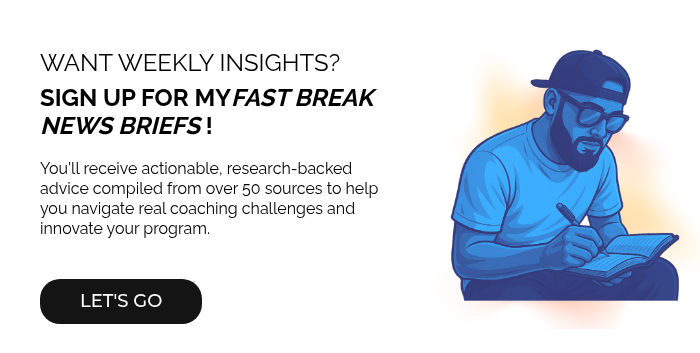Youth Basketball Coaching News Brief [10/6/25]
Nov 2, 2025 11:09:16 PM Coach Wolfe 13 min read
.png?width=1000&name=10-6%20(1).png)
Hey Coach!The wait is almost over—conditioning weeks are nearly here! During the off-season, I’ve been busy revamping some exciting features you’ll want to check out:
Now’s the perfect time to jump in and help energize our online community. I’d love for you to be part of it—and yes, there are some fun incentives waiting for you! Happy coaching! |
|
Mike Wolfe "Coach Better, Together." |
|
|
Soon you'll hear about game-changing coaching stories, but first, a question.If you could access NBA-level training technology for your youth players — the same tech used by 300+ college programs and most professional teams — would you? Here's what happened this week that changes the game… Brooklyn Nets Open $10M+ Youth Training Center With NBA-Level TechnologyBrooklyn Sports & Entertainment opened an 18,600-square-foot youth basketball training center on September 25, 2025, directly across from Barclays Center. Not a rec center. Not a community gym. A legitimate training facility with technology that most youth programs can't even dream about. The facility features eight Shoot360 interactive training stations — five shooting cages and three skill cages — making it the only youth training center in the tri-state area with this technology. Here's what matters for YOU as a coach:
‼️ What You Can Steal:
Source: Youth Sports Business Report, September 25, 2025 |
Leader's Principle: The best youth development systems think in decades, not seasons. Plant trees now, create forests later.
|
|
Beyond the Game: Mental Health Is THE Performance Issue We're Not Talking About
The Hidden Signs: Young athletes may present with physical complaints, changes in performance, or behavioral shifts. Athletes experiencing depression often report symptoms such as fatigue, sleep disturbances, and vague physical discomfort — symptoms that can easily be mistaken for the natural physical demands of sports. That kid who's "just tired" lately? Maybe it's not conditioning. Your Move This Season: According to Athletes for Hope, five evidence-based principles can shift this:
Source: Athletes for Hope, July 28, 2025 |
Leader's Principle: The strongest teams aren't the ones that never struggle. They're the ones where struggling doesn't mean suffering in silence. |
|
CDC Updates Concussion Training - September 15th ReleaseThe Setup: CDC's HEADS UP to Youth Sports Coaches: Online Concussion Training shares the latest guidance on concussion safety and prevention, providing essential information to help coaches spot signs and symptoms of possible concussions and steps to take if one occurs. What's New: Updated September 15, 2025. Not optional guidance — this is the standard that'll be referenced if something goes wrong. Quick Win: Take 30 minutes this week. Complete the free online training. Download the certificate. File it. Done? You just reduced your program's legal risk and increased your players' safety. Source: CDC, September 15, 2025 |
|
|
Introducing Leader RewardsWith our new rewards program, participation in our online community earns points that go towards monthly raffle prize entries, discounts and special offers. The first raffle will be held Oct. 31st! |
|
|
|
THIS WEEK'S PATTERNStudy these stories closely and you'll see three themes emerging: 1. Technology + Youth Development = Competitive Moat 2. Mental Health Is No Longer "Soft Stuff" 3. Certification Becoming Non-Negotiable |
YOUR PLAYBOOK FOR THE WEEK
Do This Now:
Do This Soon:
Think About This: The Brooklyn Nets invested millions because they understand: The team that develops the best youth infrastructure wins the next generation. You can't build an 18,000 sq ft facility. But you CAN:
The Question: What infrastructure are you building that'll matter 5 years from now?
|
|
Compiled using a 15-category comprehensive search framework targeting 50+ high-priority sources across youth basketball coaching domains. |
|
"The Fast Break Newsletter from Hoop Leaders is one of the best publications for basketball coaches out there. In a world with tons of information at our fingertips, Coach Wolfe does a great job of cutting through the noise. Thank you for this great tool for coaches at all levels trying to make a positive impact on our players and community." — Coach Hannah D. |

Coach Wolfe
Hi! I'm Mike Wolfe. I’ve coached high school basketball for 15 years, and if there’s one thing I know for sure, it’s that growth never stops for players or coaches. I created Hoop Leaders to share what I’ve learned, admit what I’m still figuring out, and collaborate with coaches who believe the job is bigger than wins and losses. Here, we trade ideas, sharpen fundamentals, build confidence, and strive to keep our athletes mentally, physically and spiritually healthy—so they leave our programs better players and even better people. I hope you'll join us!
Let's Coach Better, Together.

